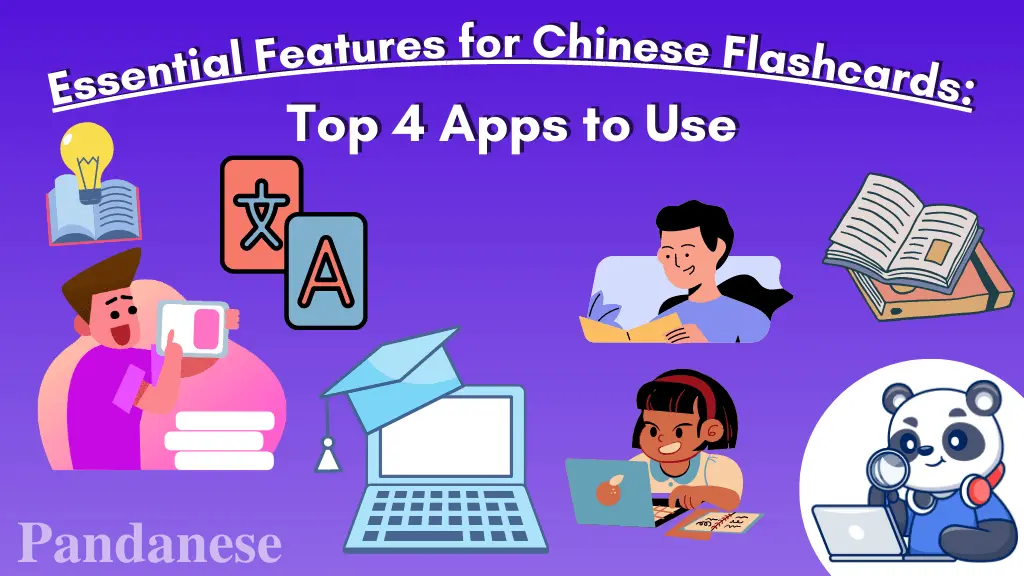
7 Essential Features for Chinese Flashcards: Top 4 Apps to Use
Incorporating flashcards is one of the most common ways to learn vocabulary. While the paper is fine, there is so much to explore with different flashcards features with technology.
So, prepare to supercharge your journey as we look at the essential features you should consider in these top apps to learn Chinese!
What should Chinese flashcards have?
Chinese flashcards are a great way to help Mandarin learners study Chinese entertainingly and effectively. So what features should be incorporated into these cards for them to reach their full potential?
There are different criteria for flashcards to be successful for you. Let's take a look at them.
1. Extensive vocabulary coverage:
A wide range of Chinese vocabulary is incredibly advantageous for learners since it greatly boosts their ability to express ideas and converse.
Additionally, it will improve their decoding capabilities, comprehension skills, and fluency.
2. Pronunciation and tone practice:
Using flashcards that pronounce words and hear their tones is a must-have.
While any learner can read the pinyin with accent marks, listening and repeating the words will help you fully grasp the word you are learning.
While talking to a native speaker is the way to pronounce and tone practice, a flashcard app with this feature will go a longer way than those without one.
3. What is the Chinese input?

Pinyin input for Chinese, yoyochinese
Typing in Chinese helps reinforce the character’s spelling and pronunciation. While it’s easy to look at and flip a character card, it’s more effective to type in your answer.
Knowing which Chinese keyboard input the flashcard software uses will depend on your preference.
There are three ways to type:
Pinyin input: Typing in pinyin to get the characters
Stroke input: Tying the character through their strokes
Handwritten input: Drawing out the characters
Knowing which keyboard input the flashcards accept will lessen your frustration.
4. Character stroke order
Recognizing and knowing the stroke order is necessary if you need to write Chinese characters.
Flashcards that show you the Chinese characters' stroke order and have you rewrite it as practice is an effective way to memorize the characters.
5. Example sentences and context
By providing Chinese sentence examples and giving context to the usage of each word, students will be able to fully understand the nuances of the language and use it more accurately when conversing with others.
This feature is extremely helpful for those who want to focus on Chinese sentence structure and grammar.
6. Spaced Repetition System (SRS):
An invaluable feature that every flashcard software should have.

Visualization of how the SRS system works
The Spaced Repetition System (SRS) technique builds on top of itself for you to effectively review and learn. This system has you review what you learned in the past in spaced intervals to have a better memory recall.
This system helps you learn and remember information more effectively by leveraging the spacing effect and tailoring the review schedule to your individual learning needs—an effective tool for anyone learning Chinese.
7. Customization and personalization:
While you don't have to make flashcards individually, having the power to customize them lets you add your own touch.
For example, if you have a different way of memorizing a character, you should be able to change the flashcard to suit your learning style best.
This control allows learners to engage better with their studies, resulting in higher retention rates.
Choosing the Right Chinese Flashcard App
Let's look at the top four Chinese flashcard apps in the market: Pandanese, Pleco, Anki, and Quizlet. These popular learning tools provide helpful features to enhance your language-studying experience by saving both time and energy.
In this article, we will go through each app feature-by-feature to understand how they all help improve fluency in the Chinese language.
Pandanese: #1 Chinese flashcard for mastering Chinese characters
Pandanese is a Chinese learning software designed by language experts to build your Chinese vocabulary.

Pandanese dashboard
Even with a free account, there are no ads. You get vocabulary lists at each level and see your learning history of all the radicals, Chinese characters, and vocabulary you've learned.
Especially the SRS system, it is repetition galore. They will show up to help you retain past characters even when you're at a higher level. This method will help you create long-term memories for learning Chinese.
With an easy mnemonic device and customizability, Pandanese is the perfect Chinese flashcard to help you.
Free: First 2-3 levels free
Month: Full access for $9/month
Annual: 2 months free; Full access for $89/year
Lifetime: Full access for $299
Extensive vocabulary words |
✅ |
Pronunciation and tones |
✅ |
Chinese Input |
Type in pinyin Also, accept typed pinyin with tone markers |
Character stroke order |
- |
Example sentence and context |
- |
SRS system |
✅ |
Customizable |
✅ |
Free trial |
✅ |
Pandanese has everything you need if you want to build up your Chinese vocabulary. Knowing the foundations lets you be able to interpret and understand Chinese sentences.
Pleco: The Chinese dictionary app

Pleco is best known as a Chinese dictionary software. Like any dictionary app, you type the word in English or Chinese and get the reverse.
But they also have an iOS flashcard system!
Since it's a branch of their main app, the flashcards software lets you create, import, organize, and study your cards. A Chinese character is known, and on the flip side, you can get their pinyin reading, pronunciation, sample sentences, audio, stroke order diagrams, and sometimes grammar.
Free basic download
Flashcard system ($9.99)
Basic Bundle (US $29.99)
Professional Bundle (US $59.99)
Extensive vocabulary words |
Additional purchase |
Pronunciation and tones |
✅ |
Chinese Input |
- |
Character stroke order |
Additional purchase |
Example sentence and context |
✅* *most common characters will have examples |
SRS system |
✅ |
Customizable |
- |
Free? |
Only the app Additional purchases for other features |
Pleco is perfect for when you want to look up any Chinese vocabulary.
Anki: The most customizable flashcard
Anki is a flashcard program where you can download or create your own flashcards.
The number one pro is that it is customizable, and you can edit the flashcard. It offers images, videos, and audio options.
However, with so many different flashcard decks for learning Chinese, it can be hard where to start. Some decks might have an example sentence and native speaker audio, while others might focus more on vocabulary words or characters.
Price plan:
It's free to download on iOS and Android but has in-app purchases for more features.
Extensive vocabulary words |
Depends on the flashcard deck |
Pronunciation and tones |
Depends on the flashcard deck |
Chinese Input |
- |
Character stroke order |
- |
Example sentence and context |
Depends on the flashcard deck |
SRS system |
✅ |
Customizable |
- |
Anki has many features, but it all depends on the flashcard deck you choose to pick. You can always create your own deck, but it will take time to create.
Quizlet: A study and quiz tool

Quizlet's Chinese flashcard search
Quizlet is the number one tool that students use before jumping to a specific flashcard software.
It has many features besides being a flashcard, such as its learn, test, and match feature. These other features gamify learning Chinese characters.
Overall Quizlet is an extremely popular choice when starting. It is free, but their QuizletPlus offers removes no ads, lets you study offline, and other features.
Monthly: ¥700/ month
Annual: ¥3,140/ year; Free 7-day trail
Extensive vocabulary words |
Depends on the set |
Pronunciation and tones |
Depends on the set Sometimes not accurate |
Chinese Input |
Depends on the set |
Character stroke order |
Depends on the set |
Example sentence and context |
Depends on the set |
SRS system |
- |
Customizable |
- |
Free? |
✅ Additional purchases for other features |
Quizlet offers fun games to test what you learned.
Which is better: digital vs. paper flashcards?
Many language learners find traditional paper for Chinese vocabulary flashcards effective when it comes to learning Chinese. They are portable and physical, which can be engaging for students.
Digital flashcards offer even more convenience with features like audio recordings, example sentences, and interactive elements that help make learning enjoyable and useful. They can quickly update via any internet-connected device, whereas updating paper cards is much slower.
That being said, certain individuals might prefer standard flashcards because working on apps could lead them down to other distractions or due to personal preference when it comes to studying their chosen foreign language.
It’s ultimately up to you and what you are looking for. Both choices have something valuable to contribute toward achieving fluency in Chinese.
Frequently asked questions
Are flashcards good for learning Chinese?
Learning Chinese with flashcards is an effective way to review the past vocabulary you've learned before constantly.
You can create a flashcard in different ways, but there are also other decks you can download and use.
Are physical or digital flashcards better?
It all depends on your preference.
In terms of convenience, digital is the way to go, as it's easier to create, copy, paste, etc. While paper flashcards have you write and retain what you wrote.
In closing
Finding the perfect app for Chinese language learning with all your desired features can be difficult. We looked into the best Chinese flashcard apps and their features to boost your Chinese language skills.
The easiest way to learn Chinese & build vocabulary

